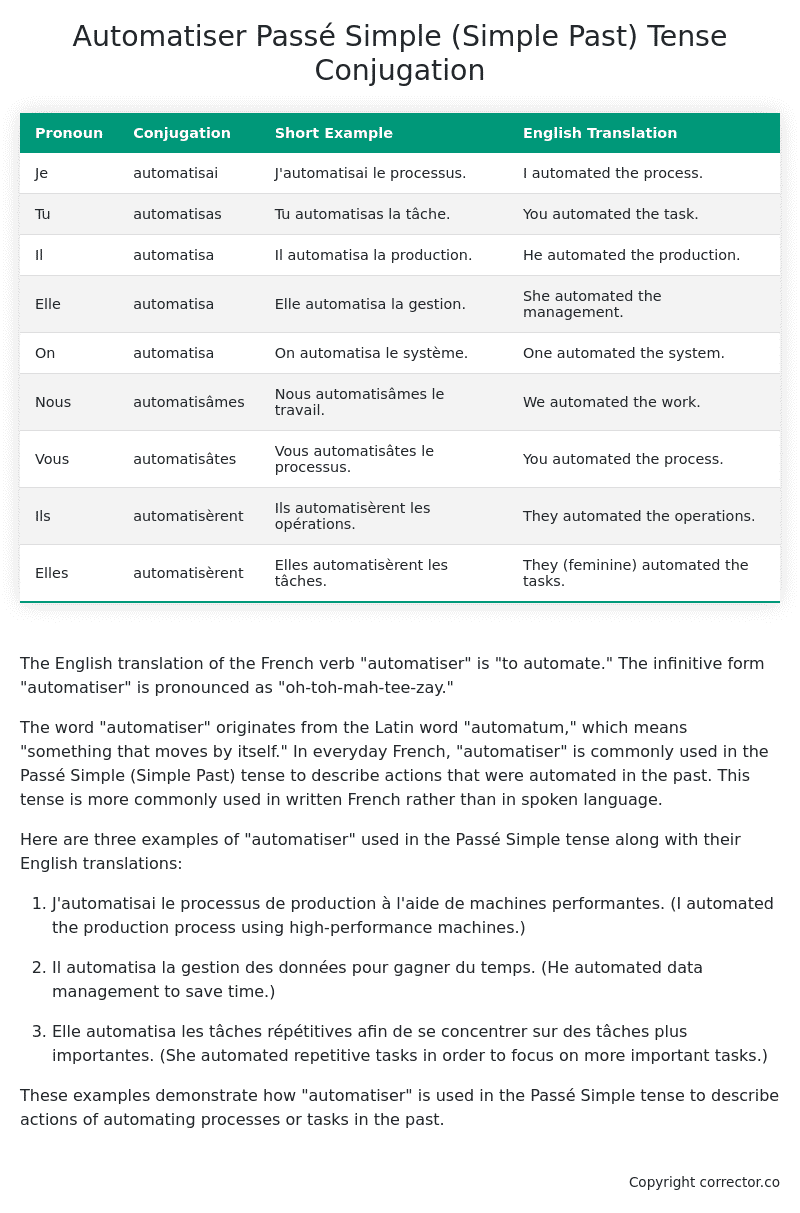Passé Simple (Simple Past) Tense Conjugation of the French Verb automatiser
Introduction to the verb automatiser
The English translation of the French verb “automatiser” is “to automate.” The infinitive form “automatiser” is pronounced as “oh-toh-mah-tee-zay.”
The word “automatiser” originates from the Latin word “automatum,” which means “something that moves by itself.” In everyday French, “automatiser” is commonly used in the Passé Simple (Simple Past) tense to describe actions that were automated in the past. This tense is more commonly used in written French rather than in spoken language.
Here are three examples of “automatiser” used in the Passé Simple tense along with their English translations:
-
J’automatisai le processus de production à l’aide de machines performantes.
(I automated the production process using high-performance machines.) -
Il automatisa la gestion des données pour gagner du temps.
(He automated data management to save time.) -
Elle automatisa les tâches répétitives afin de se concentrer sur des tâches plus importantes.
(She automated repetitive tasks in order to focus on more important tasks.)
These examples demonstrate how “automatiser” is used in the Passé Simple tense to describe actions of automating processes or tasks in the past.
Table of the Passé Simple (Simple Past) Tense Conjugation of automatiser
| Pronoun | Conjugation | Short Example | English Translation |
|---|---|---|---|
| Je | automatisai | J’automatisai le processus. | I automated the process. |
| Tu | automatisas | Tu automatisas la tâche. | You automated the task. |
| Il | automatisa | Il automatisa la production. | He automated the production. |
| Elle | automatisa | Elle automatisa la gestion. | She automated the management. |
| On | automatisa | On automatisa le système. | One automated the system. |
| Nous | automatisâmes | Nous automatisâmes le travail. | We automated the work. |
| Vous | automatisâtes | Vous automatisâtes le processus. | You automated the process. |
| Ils | automatisèrent | Ils automatisèrent les opérations. | They automated the operations. |
| Elles | automatisèrent | Elles automatisèrent les tâches. | They (feminine) automated the tasks. |
Other Conjugations for Automatiser.
Le Present (Present Tense) Conjugation of the French Verb automatiser
Imparfait (Imperfect) Tense Conjugation of the French Verb automatiser
Passé Simple (Simple Past) Tense Conjugation of the French Verb automatiser (You’re reading it right now!)
Passé Composé (Present Perfect) Tense Conjugation of the French Verb automatiser
Futur Simple (Simple Future) Tense Conjugation of the French Verb automatiser
Futur Proche (Near Future) Tense Conjugation of the French Verb automatiser
Plus-que-parfait (Pluperfect) Tense Conjugation of the French Verb automatiser
Passé Antérieur (Past Anterior) Tense Conjugation of the French Verb automatiser
Futur Antérieur (Future Anterior) Tense Conjugation of the French Verb automatiser
Subjonctif Présent (Subjunctive Present) Tense Conjugation of the French Verb automatiser
Subjonctif Passé (Subjunctive Past) Tense Conjugation of the French Verb automatiser
Subjonctif Imparfait (Subjunctive Imperfect) Tense Conjugation of the French Verb automatiser
Conditionnel Présent (Conditional Present) Tense Conjugation of the French Verb automatiser
Conditionnel Passé (Conditional Past) Tense Conjugation of the French Verb automatiser
Conditionnel Passé II (Conditional Past II) Tense Conjugation of the French Verb automatiser
L’impératif Présent (Imperative Present) Tense Conjugation of the French Verb automatiser
L’impératif Passé (Imperative Past) Tense Conjugation of the French Verb automatiser
L’infinitif Présent (Infinitive Present) Tense Conjugation of the French Verb automatiser
L’infinitif Passé (Infinitive Past) Tense Conjugation of the French Verb automatiser
Le Participe Présent (Present Participle) Tense Conjugation of the French Verb automatiser
Le Participe Passé (Past Participle) Tense Conjugation of the French Verb automatiser
Struggling with French verbs or the language in general? Why not use our free French Grammar Checker – no registration required!
Get a FREE Download Study Sheet of this Conjugation 🔥
Simply right click the image below, click “save image” and get your free reference for the automatiser Passé Simple tense conjugation!

Automatiser – About the French Passé Simple (Simple Past) Tense
Formation
Usage
Narration
Historical Context
Interactions with other tenses
Passé Composé
Imparfait
Conditional and Subjunctive
Summary
I hope you enjoyed this article on the verb automatiser. Still in a learning mood? Check out another TOTALLY random French verb conjugation!


